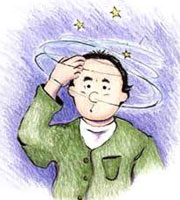What makes people dizzy when they spin?
[ 2006-03-02 07:56 ]
 Rolling down a hill or spinning around in endless circles
causes dizziness or vertigo because
hair-like sensory nerve cells in our
ears send wrong messages to our brain. Rolling down a hill or spinning around in endless circles
causes dizziness or vertigo because
hair-like sensory nerve cells in our
ears send wrong messages to our brain.
The motions of our bodies are detected by the vestibular system found in the upper part of
our inner ear. The vestibular system senses whether we are standing
up or lying down.
When we spin in circles or get up too fast from the couch, we
feel dizzy and lightheaded due to the
vestibular system's nerve reactions to these unusual motions.
Here's how our vestibular system reacts to a slight change in
direction when we bend our heads: The vestibular system senses
motion through three semicircular canals that are at right angles to
one another. Not only do these canals have hair-like sensory nerve
cells, but they also contain a fluid
called endolymph.
Following the principle of inertia,
endolymph resists changes in motion. As a result of this resistance,
the endolymph lags behind and stimulates hair cells to send nerve
signals to the brain. Our brain interprets the nerve messages and
knows which direction the head moved.
However, when we spin, our brain receives mixed messages. The
endolymph slowly begins to move in the same direction we are
spinning. As time goes by, the endolymph catches up to the rate of
speed we are spinning and no longer stimulates the hair-like nerve
cells. This causes our brain to quickly adapt to the nerve signals.
However, when we stop spinning, the endolymph continues to move and
stimulates hair cells in the opposite direction.
These hair cells send wrong messages to the brain making it think
that the head is still spinning although it actually has stopped. As
a result of this inaccurate signal, we experience dizziness.
Eventually, the endolymph stops moving and no more signals are sent
to the brain. The brain interprets that the spinning motion has
ceased and the dizziness disappears.
|
|
note:
|
vertigo: 晕头转向
sensory nerve: 感觉神经
vestibular system:
前庭系统
lightheaded: 头昏眼花的
fluid: 液体
endolymph: 内淋巴
inertia: 惯性
| | |
|